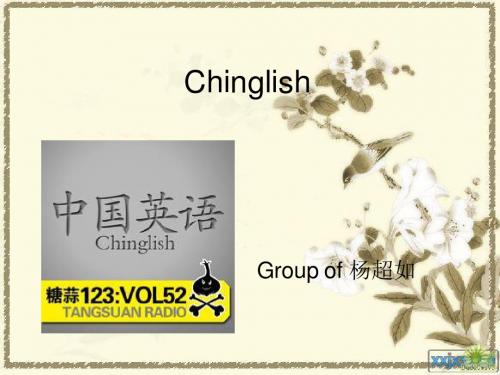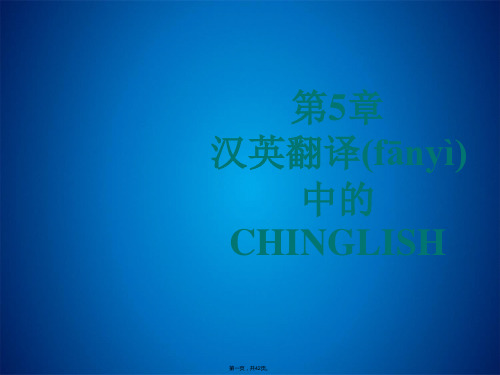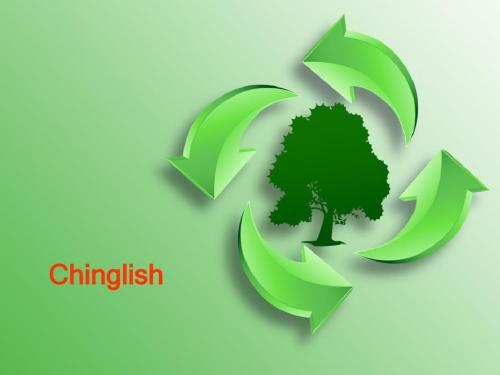chinglish演讲ppt
合集下载
chinglish演讲ppt

Bumf Box for shouzhi xiang (手纸箱 "toilet paper box/case"), employs the outmoded British English word bumf, which is a shortened form of bumfodder "toilet paper; useless documents"
Causes
• Chinglish has various causes, most commonly erroneous Chinese dictionaries and translation software (mentioned above by Fallows).
• differentiate root and ancillary causes of Chinglish. • The root causes are outdated Chinese-English dictionaries and incorrect English as a foreign language textbooks. • Ancillary causes include misspelling, mediocre Englishlanguage teaching, sloppy translation, and arrogance. They warn that, "today’s and teachers in China are passing on obsolete translations and incorrect rules of language to students. • In turn, Chinglish gets duplicated across society, particularly now during today’s period of rapid opening to the outside world and the widespread use of English. The resultant flood of Chinglish will perpetuate unless it is corrected now."
中式英语 ppt课件

活到forever) • 3.祝你有个... • 误: wish you have a ... 正:I wish you a ... • 4.给你 • 误:give you 正: here you are • 5.很喜欢... • 误: very like ... 正: like ... very much • 6.黄头发 • 误: yellow hair 正:blond/bloPnPdT课e件(西方人没有yellow hair的说法)22
boots 不吃
holy high 好厉害
The Menu, please 热门妞,普丽丝
what’s your name? 挖词哟内梦
Good morning,teacher! 狗头猫脸踢一脚
PPT课件
28
小学生学英语标注雷人
• bus(公共汽车)、yes(是)、girls(女孩们)、miss(想念)、school(学 校)……这几个英语单词,本身很普通,但如果你看到这位小学生给 出的中文标注,就不会这么想了!日前,一个网名为“我是猪”的 网友,在某知名网站上发了一个名为“雷人的小学生学英语标注图” 的帖子,被网友笑评为“雷死人不偿命”。在这幅图上,小学生给 英语单词做出如下谐音标注:bus(爸死)、yes(爷死)、girls(哥死)、 miss(妹死)、school(死光)……更让人捧腹的是,对于“hands、 hands、two hands,I have two hands”这句话,这位小学生给出 的标注是“汉子、汉子、偷汉子,俺还来偷汉子”。
PPT课件
20
总结
以上各句从语法上来讲没有多大的问题,但也属于中国式英语。 原因是说话人仍是用英语的外壳来表达中国人的思想感情 而忽视了在英语文化背景下允不允许这样讲。中国式英语的 内涵非常复杂,其根本原因还是缺乏对两种文化差异的了解。
boots 不吃
holy high 好厉害
The Menu, please 热门妞,普丽丝
what’s your name? 挖词哟内梦
Good morning,teacher! 狗头猫脸踢一脚
PPT课件
28
小学生学英语标注雷人
• bus(公共汽车)、yes(是)、girls(女孩们)、miss(想念)、school(学 校)……这几个英语单词,本身很普通,但如果你看到这位小学生给 出的中文标注,就不会这么想了!日前,一个网名为“我是猪”的 网友,在某知名网站上发了一个名为“雷人的小学生学英语标注图” 的帖子,被网友笑评为“雷死人不偿命”。在这幅图上,小学生给 英语单词做出如下谐音标注:bus(爸死)、yes(爷死)、girls(哥死)、 miss(妹死)、school(死光)……更让人捧腹的是,对于“hands、 hands、two hands,I have two hands”这句话,这位小学生给出 的标注是“汉子、汉子、偷汉子,俺还来偷汉子”。
PPT课件
20
总结
以上各句从语法上来讲没有多大的问题,但也属于中国式英语。 原因是说话人仍是用英语的外壳来表达中国人的思想感情 而忽视了在英语文化背景下允不允许这样讲。中国式英语的 内涵非常复杂,其根本原因还是缺乏对两种文化差异的了解。
第5章 汉英翻译的CHINGLISH汉译英 教学课件(共42张PPT)

第十四页,共42页。
2.2 Unnecessary Words
❖ A classic statement in the famous book of William Strunk, Jr. and E. B. White is that, “Vigorous writing is concise. A sentence should contain no unnecessary words, a paragraph no unnecessary sentence〞.
第十二页,共42页。
2 Manifestations of Chinglish in ChineseEnglish Translation
第十三页,共42页。
❖ 2.1 Rigid Translation ❖ This kind of error is the most serious one.
第十一页,共42页。
❖ 她在一所重点大学读书, 每天早上上课(shàng kè), 她听课很认真, 课后复习, 做作业, 经常熬 夜, 她真是一个勤奋的学生, 一个好学生啊!
❖ B: Being a student at a key university, she attends classes every morning, during which she listens to the lecture attentively. Her homework and preparation for the lessons take much of her spare time and sometimes keep her up until late into the night. She is hardworking and in everybody’s opinion a good student.
2.2 Unnecessary Words
❖ A classic statement in the famous book of William Strunk, Jr. and E. B. White is that, “Vigorous writing is concise. A sentence should contain no unnecessary words, a paragraph no unnecessary sentence〞.
第十二页,共42页。
2 Manifestations of Chinglish in ChineseEnglish Translation
第十三页,共42页。
❖ 2.1 Rigid Translation ❖ This kind of error is the most serious one.
第十一页,共42页。
❖ 她在一所重点大学读书, 每天早上上课(shàng kè), 她听课很认真, 课后复习, 做作业, 经常熬 夜, 她真是一个勤奋的学生, 一个好学生啊!
❖ B: Being a student at a key university, she attends classes every morning, during which she listens to the lecture attentively. Her homework and preparation for the lessons take much of her spare time and sometimes keep her up until late into the night. She is hardworking and in everybody’s opinion a good student.
Chinglish 中式英语PPT课件

5)不同于中式英语。
.
4
以下我们从“中国英语”形成途径对 “中国英语”的词汇、短语和句子作一 些简要介绍:
.
5
1.音译
“中国英语”中有一部分词汇或短语是根据中 国普通话直接转化生成的。
.
6
(1)有关历史文化的
xiucai秀才,yamen衙门,dazibao大字报, putonghua普通话,fenghuang凤凰 ,Tong秘密组织, IChing《易经》, Confucius孔夫子 TaoTeChing《道德经》,Tao 道教,Lao-tzu老子,
B: in another 30 to 50 years, we shall approach the level of the developed countries (通常情况下,“发达国家”已经意味着是 经济上发达的国家,因此,没有必要再 加上修饰y Modifier
老外:“I want to speak to your head.”
前台小姐:“Head not zai. You tomorrow come!
.
24
北京公共场所翻译错误
.
25
北京公共场所翻译错误
.
26
北京公共场所翻译错误
.
27
Bulk Preserved Fruit
.
28
Dried Goods
来是卡姆(come),去是狗(go),明天就吃
兔,猫肉(tomorrow).马铃薯就是胖打素
(potato).
.
30
中式英语的特点
Unnecessary Words
他的名字叫约翰。 A: His name is called John.
B: His name is John
.
4
以下我们从“中国英语”形成途径对 “中国英语”的词汇、短语和句子作一 些简要介绍:
.
5
1.音译
“中国英语”中有一部分词汇或短语是根据中 国普通话直接转化生成的。
.
6
(1)有关历史文化的
xiucai秀才,yamen衙门,dazibao大字报, putonghua普通话,fenghuang凤凰 ,Tong秘密组织, IChing《易经》, Confucius孔夫子 TaoTeChing《道德经》,Tao 道教,Lao-tzu老子,
B: in another 30 to 50 years, we shall approach the level of the developed countries (通常情况下,“发达国家”已经意味着是 经济上发达的国家,因此,没有必要再 加上修饰y Modifier
老外:“I want to speak to your head.”
前台小姐:“Head not zai. You tomorrow come!
.
24
北京公共场所翻译错误
.
25
北京公共场所翻译错误
.
26
北京公共场所翻译错误
.
27
Bulk Preserved Fruit
.
28
Dried Goods
来是卡姆(come),去是狗(go),明天就吃
兔,猫肉(tomorrow).马铃薯就是胖打素
(potato).
.
30
中式英语的特点
Unnecessary Words
他的名字叫约翰。 A: His name is called John.
B: His name is John
Chinglish

谢谢观赏
WPS Office
Make Presentation much more fun
@WPS官方微博 @kingsoftwps
Chinglish
• Geliable! • Geliable其实是从网友发言中的 ungeliable转过来的。前缀“un-”在英 语中表示否定,后缀“-able(表示能 力)”在英语中表示单词为形容词; 而中间的“geli”却是直接音译自中文 的“给力(geili)”。
• Niubility或newbility • 牛× • 显然是拼音“Niubi”+表示能力 的英文后缀“-bility”组合而成的 一个词。也有网友写法为 Newbility。
• Heart flower angry open. 心花怒放 • Horse horse tiger tiger. 马马虎虎 • Good good study, day day up. 好好学习, 天天向上 • No three no four. 不三不四 • Know is know, noknow is noknow. 知之为 知之,不知为不知
• How are you ? How old are you? 怎么是你,怎么 老是你? • You have seed. I will give you some color to see see. Brothers!Together up! 你有种,我要给你点颜 色瞧瞧,兄弟们,一起上! • Dragon born dragon, chicken born chicken, mouse"s son can make hole! 龙生龙,凤生凤,老 鼠的儿子会打洞! • Chickens That Did Not Have Sexual Experience 童子鸡 • Four Glad Meatballs 直译:四个开心的肉球 被用 为:四喜丸子
英语演讲中国文化ppt

Taoist philosophy emphasizes the interconnectivity of all things and the harmony of nature and humanity It also promotes the idea of wu wei, or non action, and emphasizes the importance of balance and modeling in all aspects of life
Confucianism
Laozi, the foundation of Taoism, emphasized the importance of following the natural way of things and returning to simplicity and harmony His teachings are compiled in the Tao Te Ching
Musical art
Summary
Traditional Chinese Opera Art is an important part of Chinese culture, which includes various types of traditional operas, such as Peking Opera, Cantonese Opera, Sichuan Opera, etc
Period and Background
Key Figures
Influence
Modern Chinese Culture
02
The core elements of Chinese culture
Confucius's Thoughts
Chinglish-vs-China-English----中式英语和中国式英语PPT课件
.11级商务英语2班第二组
6
The features of Chinglish
• 2.Syntactic features
Chinese English reflects the influence of Chinese syntax and grammar in Chinese, verbs are not conjugated (either for tense or pronoun), and there is no equivalent word for "the." • For instance: people mountain people sea(人山人海)
Ruan yuhui(2005-4)lists the typical features of Chinese English. For instance: old three old four(老三老四) ,
half half(利益均分) three piece book(三本书)
2020/5/17
commonly applied to ungrammatical or
nonsensical English in Chinese contexts,
and may have pejorative or deprecating
Байду номын сангаас
connotations. Chinglish does not belong to
The relationship between the four concepts 1.Englishes 2. China English 3. Chinglish 4. Interlanguage
Chinglish-5
Look at the following examples:
1.Biographical background data on cadres should be correctly evaluated and comprehended 2. The present boom of foreign investment in China has prompted the country to consider and eventually work out way to use such investment more efficiently 3.The Chinese Foreign Ministry spokesman called the decision “yet another attempt by British Hong Kong authorities to interfere with and undermine the SinoSinoBritish talks” talks” (meaning of one is contained in or implied by another )
A translator has to decide:
●
Is there a difference between these two words? Is the difference important? Does the second word add anything significant to the first?
What is Chinglish ? (5)
Part One Unnecessary Words Nhomakorabea■
Redundant Twins
Chinglish——中式英语
• 当中国人发明了“good good study,day day up” 后,这个看起来有些雷人的词汇就带领着 Chinglish一路前进。当四川人发明了 “standing flower”(站花)后,川式英语也 开始不断出现在川菜菜谱的翻译中。
在四川成都方言里,用”站花儿“来 称那些太 爱出风头,太跳,故意引起别人注意,但是所有人 都比较反感的那种人。 有些人更用英语来调侃,增加喜剧效果,即 "standing flower"。
Thank you !
ALBERT
3)Saying the same thing twice:
e.g.我们必须遵守时间按时到达车站。 We must arrive at the station on time and be punctual.
4
中式英语产生的原因:
1.Cultural difference e.g.自由恋爱 free love (自由性爱) free choice of marriage partner 2. Different habitual(习惯的)usage e.g.西北—northeast 迟早--- sooner or later 得失---loss and gain
Chinglish
——中式英语
• School of International Languages and cultures • Class: 5B1016 • Name:王泽
1 什么是Chiglish
?
Chinglish,即“中式英语”。学习者在写作中往往 先用汉语打腹稿,或列出中文提纲,再把汉语一句句机械 地转换成英语,带有明显的汉语痕迹,因而不能被以英语 为母语者所接受。 中式英语指带有中文语音、语法、词 汇特色的英语。中式英语在英语被称为“Chinglish”, 是汉语及英语的英文混合而成的合体字。
chinglish(中式英文)
• heart flower angry open 心花怒放 • want money no; want life one! 要钱没有,要命一条 • you have two down son
你有两下子。
• let the horse come on 放马过来 • you give me stop! 你给我站住! • I give you face you don’t wanna face 给你脸你不要脸 • red face know me
Chinglish
Niubility
Smilence
• we two who and who? 咱俩谁跟谁阿
• how are you ? how old are you? 怎么是你,怎么老是你? • you don’t bird me,I don’t bird you 你不鸟我,我也不鸟 • you have seed ,I will give you some color to see see
你有种,我要给你点颜色看看 你
• Government abuse chicken 宫暴鸡丁 • you give me stop! 你给我站住! • take iron coffee 拿铁咖啡 • American Chinese not enough 美中不足
• Where cool where you stay!哪凉快上哪呆着
红颜知己
• seven up eight down 七上八下
• no three no four 不三不四
• love who who
爱谁谁
• look through autumn water 望穿秋水 • May I borrow your light?
你有两下子。
• let the horse come on 放马过来 • you give me stop! 你给我站住! • I give you face you don’t wanna face 给你脸你不要脸 • red face know me
Chinglish
Niubility
Smilence
• we two who and who? 咱俩谁跟谁阿
• how are you ? how old are you? 怎么是你,怎么老是你? • you don’t bird me,I don’t bird you 你不鸟我,我也不鸟 • you have seed ,I will give you some color to see see
你有种,我要给你点颜色看看 你
• Government abuse chicken 宫暴鸡丁 • you give me stop! 你给我站住! • take iron coffee 拿铁咖啡 • American Chinese not enough 美中不足
• Where cool where you stay!哪凉快上哪呆着
红颜知己
• seven up eight down 七上八下
• no three no four 不三不四
• love who who
爱谁谁
• look through autumn water 望穿秋水 • May I borrow your light?
- 1、下载文档前请自行甄别文档内容的完整性,平台不提供额外的编辑、内容补充、找答案等附加服务。
- 2、"仅部分预览"的文档,不可在线预览部分如存在完整性等问题,可反馈申请退款(可完整预览的文档不适用该条件!)。
- 3、如文档侵犯您的权益,请联系客服反馈,我们会尽快为您处理(人工客服工作时间:9:00-18:30)。
• Chinglish reflects the influence of Chinese syntax and grammar.For instance, Chinese verbs are not necessarily conjugated and there is no equivalent article for English "the", both of which can create awkward translations.
• Wordiness. Unnecessary words and convoluted sentences are hallmarks of Chinglish translation. For example, the Civil Aviation Administration of China announced, "CAAC has decided to start the business of advance booking and ticketing”, which could simply say “CAAC now accepts advance booking and ticketing.” • Wrong word order. A host in Shenyang toasted a group of foreign investors with "Up your bottoms!" instead of "Bottoms up!
• A sign for tourists in Sichuan
Slip carefully. (小心滑倒 "Be careful not to slip and fall")
• Image taken by author of a sign on a door. This is an example of Chinglish. This door is located in the city of Taipei, Taiwan, the foreign immigrants recreational hall administered by the Taipei government. The word "Steek" is a legitimate English word, except it fell from common use hundreds of years ago.
if you want to find more information about chinglish, please go to /wiki/Chinglish
Thank you The end
ቤተ መጻሕፍቲ ባይዱ
• Spread to fuck the fruit is a Chinese supermarket sign mistranslation of sàn gānguǒ (simplified Chinese: 散干果; traditional Chinese: 散乾 果; literally "loose dried fruits").
• Warning sign in Chinese and Chinglish, found in a park in Guilin, Guangxi, China. This picture is wholly my own work, and it may be used as per the tag below
Features
• Cultural meanings. The English idiom "work like a horse" means "work hard", but in China horses are rarely used as draft animals and the equivalent Chinese expression uses shuiniu 水 牛 "water buffalo". • Problems of direct translation. Some Chinglish menus translate doufu 豆腐 as "bean curd", which "sounds very unappetizing" to English speakers, instead of "tofu".
Examples
• To take notice of safe: The slippery are very crafty.To take notice of safe: The slippery are very crafty. A comparable sign in a Beijing garage reads Zhuyi anquan podaolu hua (注意安全 坡道路滑 "Pay attention to safety The ramp is slippery").
Causes
• Chinglish has various causes, most commonly erroneous Chinese dictionaries and translation software (mentioned above by Fallows).
• differentiate root and ancillary causes of Chinglish. • The root causes are outdated Chinese-English dictionaries and incorrect English as a foreign language textbooks. • Ancillary causes include misspelling, mediocre Englishlanguage teaching, sloppy translation, and arrogance. They warn that, "today’s English-language publishers and teachers in China are passing on obsolete translations and incorrect rules of language to students. • In turn, Chinglish gets duplicated across society, particularly now during today’s period of rapid opening to the outside world and the widespread use of English. The resultant flood of Chinglish will perpetuate unless it is corrected now."
Chinglish
Group of 杨超如
Chinglish
• Chinglish refers to spoken or written English language that is influenced by the Chinese language. The term "Chinglish" is commonly applied to ungrammatical or nonsensical English in Chinese contexts。 Other terms for the variety of English used in China include "Chinese English", "China English", and "Sinicized English". The degree to which a Chinese variety of English exists or can be considered legitimate is disputed.
Bumf Box for shouzhi xiang (手纸箱 "toilet paper box/case"), employs the outmoded British English word bumf, which is a shortened form of bumfodder "toilet paper; useless documents"
